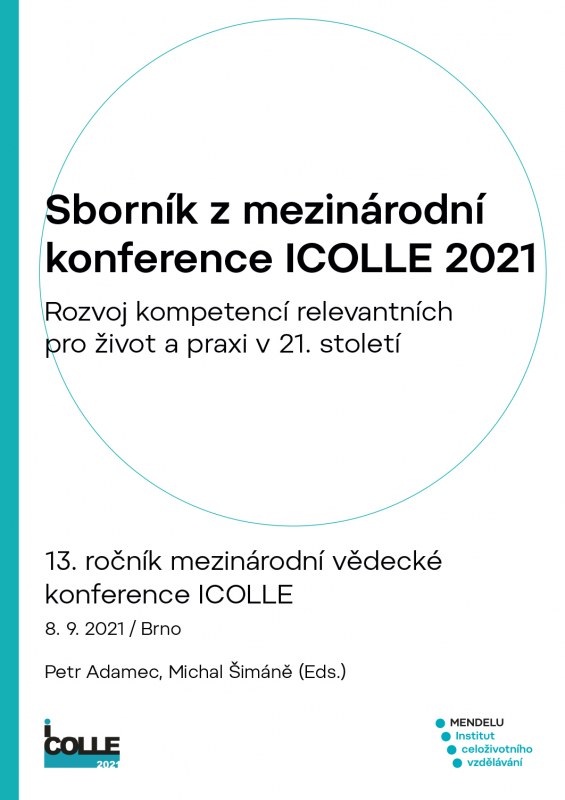
DOI: 10.11118/978-80-7509-832-0-0080
TYPOLOGIE UČITELŮ INFORMATICKÝCH PŘEDMĚTŮ ZÁKLADNÍCH ŠKOL DLE JEJICH PREFERENCÍ ZPŮSOBŮ ROZVOJE INFORMATICKÉHO MYŠLENÍ
- Milan Klement
The need to innovate the content of education in the teaching of computer science, or computer science subjects, in the conditions of Czech primary and secondary schools, is a relatively widely discussed topic today. However, as the computer science subjects` curriculum in the Czech Republic still shows resistance to significant changes, the Strategy for Digital Education until 2020, published by the Czech Ministry of Education, Youth and Sports in 2014, has recently been systematically enforced. It proposes a set of possible interventions to support the implementation of digital education into initial education, which proves to be increasingly necessary. However, the question remains as to what teaching content is preferred by the teachers of computer science subjects at primary schools, and which specific teaching topics are emphasized by them. We shall try to answer this question in the present paper, which demonstrates some partial results of a research survey focused on the issue of the preference of IT subjects` educational content taught at Czech schools, and was targeted at teachers of computer science subjects at upper primary school (6th to 9th grade).
Keywords: computer science subjects, teachers of computer science subjects, educational content
pages: 80-87, online: 2022
References
- Benvenuti, L., Van Der Vet, P., & Van Der Veer, G. (2011). Sciences, computing, informatics: who is the keeper of the real faith? Computer Science Education Research Conference. Open Universiteit, Heerlen, 73-78.
- Heisig, J. (2009). Analýza hlavních komponent a faktorová analýza. Dostupné z: http://aplikacergsg.sci.muni.cz/teorie/doprava/korelacni-pocet-2
- Hendl, J. (2008). Kvalitativní výzkum: základní teorie, metody a aplikace. Praha: Portál.
- Janík, T., Knecht, P., Najvar, P., Píšová, M., & Slavík, J. (2011). Kurikulární reforma na gymnáziích: výzkumná zjištění a doporučení. Pedagogická orientace, 21(4), 375-415.
- Ježek, S., Vaculík, M. & Wortner, V. (2006). Základní pojmy z metodologie psychologie: definice a vysvětlení. Dostupné z: http://is.muni.cz/do/1499/el/estud/fss/ps06/psy112/Vaculik__M.__Jezek__S.__Wortner__V.__2006__-Zakladni_pojmy_z_metodologie.pdf
- Koschin, F. (1992). Statgraphics aneb statistika pro každého. Praha: vydavatelství Grada.
- McDonald, R., P. (1991). Faktorová analýza a příbuzné metody v psychologii. Praha: Academia.
- Meloun, M., & Militký, J. (2006). Kompendium statistického zpracování dat: metody a řešené úlohy. Praha: Academia.
- Neumajer, O. (2014). Strategie digitálního vzdělávání do roku 2020. Moderní vyučování: časopis na podporu rozvoje škol, 20(9-10), 4-6.
- Pecáková, I. (2008). Statistika v terénních průzkumech. Praha: Professional Publishing.
- Rambousek, V., Štípek, J., & Wildová, R. (2015). ICT competencies and their development in primary and lower secondary schools in the Czech Republic. In 5th ICEEPSY InternationalConference on Education & Educational Psychology. Procedia-Social and BehavioralSciences (pp. 535-542). Istanbul: Turkey.
 Go to original source...
Go to original source... - Řezanková, H., Húsek, D., & Snášel, V. (2007). Shluková analýza dat. 1. vyd., Praha: Professional Publishing.
- Strnad, M. (2015). Přenositelnost transformace ICT výuky na 2. stupni v Anglii do českých podmínek. Nepublikovaná diplomová práce. Praha: Univerzita Karlova.
- Zuppo, C. M. (2016). Defining ICT in a Boundaryless World: The Development of a Working Hierarchy. International Journal of Managing Information Technology (IJMIT), 19-23.


